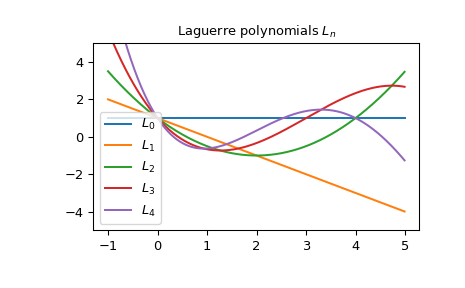scipy.special.laguerre#
- scipy.special.laguerre(n, monic=False)[source]#
Laguerre polynomial.
Defined to be the solution of
\[x\frac{d^2}{dx^2}L_n + (1 - x)\frac{d}{dx}L_n + nL_n = 0;\]\(L_n\) is a polynomial of degree \(n\).
- Parameters:
- nint
Degree of the polynomial.
- monicbool, optional
If True, scale the leading coefficient to be 1. Default is False.
- Returns:
- Lorthopoly1d
Laguerre Polynomial.
See also
genlaguerreGeneralized (associated) Laguerre polynomial.
Notes
The polynomials \(L_n\) are orthogonal over \([0, \infty)\) with weight function \(e^{-x}\).
References
[AS]Milton Abramowitz and Irene A. Stegun, eds. Handbook of Mathematical Functions with Formulas, Graphs, and Mathematical Tables. New York: Dover, 1972.
Examples
The Laguerre polynomials \(L_n\) are the special case \(\alpha = 0\) of the generalized Laguerre polynomials \(L_n^{(\alpha)}\). Let’s verify it on the interval \([-1, 1]\):
>>> import numpy as np >>> from scipy.special import genlaguerre >>> from scipy.special import laguerre >>> x = np.arange(-1.0, 1.0, 0.01) >>> np.allclose(genlaguerre(3, 0)(x), laguerre(3)(x)) True
The polynomials \(L_n\) also satisfy the recurrence relation:
\[(n + 1)L_{n+1}(x) = (2n +1 -x)L_n(x) - nL_{n-1}(x)\]This can be easily checked on \([0, 1]\) for \(n = 3\):
>>> x = np.arange(0.0, 1.0, 0.01) >>> np.allclose(4 * laguerre(4)(x), ... (7 - x) * laguerre(3)(x) - 3 * laguerre(2)(x)) True
This is the plot of the first few Laguerre polynomials \(L_n\):
>>> import matplotlib.pyplot as plt >>> x = np.arange(-1.0, 5.0, 0.01) >>> fig, ax = plt.subplots() >>> ax.set_ylim(-5.0, 5.0) >>> ax.set_title(r'Laguerre polynomials $L_n$') >>> for n in np.arange(0, 5): ... ax.plot(x, laguerre(n)(x), label=rf'$L_{n}$') >>> plt.legend(loc='best') >>> plt.show()
